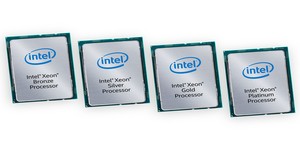
Intel has announced the launch of a Xeon-based system-on-chip (SoC) processor family, taking technologies designed for its low-power Atom and bringing them into the data centre to head Cambridge-based rival ARM off at the pass.
With the growth of cloud computing and the ubiquity of the web, there has been growing interest in using many low-power processors in the data centre in place of fewer high-performance chips. The biggest potential winner of such a paradigm shift would be ARM, which enjoys a near-monopoly of the embedded and mobile markets but whose parts are rarely seen in modern desktops or servers. For Intel, which with a near-monopoly in the data centre but whose parts are rarely seen in the mobile or embedded market has an almost opposite position, that's a threat - and one it is working to answer.
The new Intel Xeon D family takes the system-on-chip (SoC) design work developed for Intel's Atom range, where various components that would traditionally require separate north- and south-bridge chips are instead integrated onto the processor itself, to the data centre for the first time. The first two products have been confirmed: the Xeon D-1520 which has four physical cores running at 2.2GHz and 6MB of cache, and the Xeon D-1540 which has eight cores running at 2GHz and 12MB of cache. Both chips have a 45W thermal design profile (TDP), support for all Intel's latest technologies including HyperThreading, Transactional Memory, and VT-x and VT-d virtualisation technology, and are built on Intel's 14nm process node.
Intel has confirmed tray pricing for the parts at $199 and $581 per respective unit, and has named Cisco, HP, NEC, and Supermicro as companies currently building products based around the new Xeon D family. More information on the chips is available on Intel's product briefing page.
With the growth of cloud computing and the ubiquity of the web, there has been growing interest in using many low-power processors in the data centre in place of fewer high-performance chips. The biggest potential winner of such a paradigm shift would be ARM, which enjoys a near-monopoly of the embedded and mobile markets but whose parts are rarely seen in modern desktops or servers. For Intel, which with a near-monopoly in the data centre but whose parts are rarely seen in the mobile or embedded market has an almost opposite position, that's a threat - and one it is working to answer.
The new Intel Xeon D family takes the system-on-chip (SoC) design work developed for Intel's Atom range, where various components that would traditionally require separate north- and south-bridge chips are instead integrated onto the processor itself, to the data centre for the first time. The first two products have been confirmed: the Xeon D-1520 which has four physical cores running at 2.2GHz and 6MB of cache, and the Xeon D-1540 which has eight cores running at 2GHz and 12MB of cache. Both chips have a 45W thermal design profile (TDP), support for all Intel's latest technologies including HyperThreading, Transactional Memory, and VT-x and VT-d virtualisation technology, and are built on Intel's 14nm process node.
Intel has confirmed tray pricing for the parts at $199 and $581 per respective unit, and has named Cisco, HP, NEC, and Supermicro as companies currently building products based around the new Xeon D family. More information on the chips is available on Intel's product briefing page.

MSI MPG Velox 100R Chassis Review
October 14 2021 | 15:04








Want to comment? Please log in.